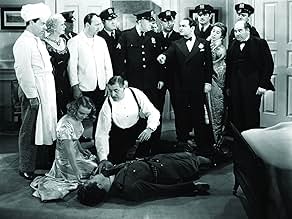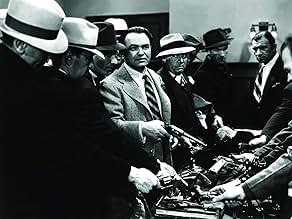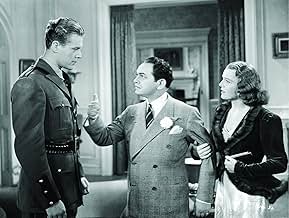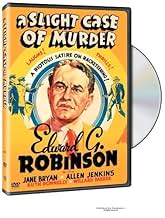AVALIAÇÃO DA IMDb
7,0/10
2,7 mil
SUA AVALIAÇÃO
Adicionar um enredo no seu idiomaFormer bootlegger Remy Marco has a slight problem with forclosing bankers, a prospective son-in-law, and four hard-to-explain corpses.Former bootlegger Remy Marco has a slight problem with forclosing bankers, a prospective son-in-law, and four hard-to-explain corpses.Former bootlegger Remy Marco has a slight problem with forclosing bankers, a prospective son-in-law, and four hard-to-explain corpses.
- Direção
- Roteiristas
- Artistas
Avaliações em destaque
"A Slight Case of Murder" is a delightful gangster comedy written by the legendary Damon Runyon and directed by Lloyd Bacon. It's also a nice change of pace for star Edward G. Robinson who gets to display his comedic talents as he spoofs his gangster image.
Remy Marco (Robinson - in an obvious spoof of his "Rico" character in "Little Caesar") is a bootlegger who has made his fortune running illegal beer during prohibition. When prohibition ends, Marco proudly announces that he's going to be strictly legit, believing that he will no longer need strong arm tactics, and that he will continue to rake in the money from legal sales. What he doesn't realize is that because he's never actually tasted his own brew, is that it tastes awful.
Now that the public can buy well brewed better tasting beer legally, Marco sees his fortune disappear over the ensuing four years. On the verge of bankruptcy, he finds himself in debt over a half a million dollars and has to deal with two predatory bankers Post (John Litel) and Ritter (Eric Stanley) who are trying to foreclose on him.
Marco's daughter Mary (Jane Bryan) has returned home and plans to marry the bumbling State Trooper son, Dick Whitewood (Willard Parker) of business tycoon Paul Harvey. Marco and his wife Nora (Ruth Donnelly) plan to host an engagement party at their country house in Saratoga. What he doesn't know is that a rival gang has heisted $500K from bookies and are holed up in Marco's house.
With his three stooges, Mike (Allen Jenkins), Lefty (Edward Brophy and Gip (Harold Huber), Marco learns that four of the five gangsters have been murdered and their bodies left in a guest bedroom while the fifth hangs around trying to escape with the money. The satchel containing the money is found by an orphan with the distinguished moniker of Douglas Fairbanks Rosenbloom (Bobby Jordan), who had been brought by Marco from the orphanage for the weekend.
And then the fun starts.
Robinson proved that he could play comedy and ranked this film among his favorites. But Warner Bros. saw him as a gangster and so he had difficulty breaking away from that genre. After he left Warners in the early forties, he turned in a number of great performances notably in "Double Indemnity" (1944) and two FRitz Lang classics, "The Woman in the Window" (1944) and "Scarlett Street" (1945). Oddly enough, he returned to Warners Bros. in 1948 to play gangster Johnny Rocco in "Key Largo" (1948).
Remy Marco (Robinson - in an obvious spoof of his "Rico" character in "Little Caesar") is a bootlegger who has made his fortune running illegal beer during prohibition. When prohibition ends, Marco proudly announces that he's going to be strictly legit, believing that he will no longer need strong arm tactics, and that he will continue to rake in the money from legal sales. What he doesn't realize is that because he's never actually tasted his own brew, is that it tastes awful.
Now that the public can buy well brewed better tasting beer legally, Marco sees his fortune disappear over the ensuing four years. On the verge of bankruptcy, he finds himself in debt over a half a million dollars and has to deal with two predatory bankers Post (John Litel) and Ritter (Eric Stanley) who are trying to foreclose on him.
Marco's daughter Mary (Jane Bryan) has returned home and plans to marry the bumbling State Trooper son, Dick Whitewood (Willard Parker) of business tycoon Paul Harvey. Marco and his wife Nora (Ruth Donnelly) plan to host an engagement party at their country house in Saratoga. What he doesn't know is that a rival gang has heisted $500K from bookies and are holed up in Marco's house.
With his three stooges, Mike (Allen Jenkins), Lefty (Edward Brophy and Gip (Harold Huber), Marco learns that four of the five gangsters have been murdered and their bodies left in a guest bedroom while the fifth hangs around trying to escape with the money. The satchel containing the money is found by an orphan with the distinguished moniker of Douglas Fairbanks Rosenbloom (Bobby Jordan), who had been brought by Marco from the orphanage for the weekend.
And then the fun starts.
Robinson proved that he could play comedy and ranked this film among his favorites. But Warner Bros. saw him as a gangster and so he had difficulty breaking away from that genre. After he left Warners in the early forties, he turned in a number of great performances notably in "Double Indemnity" (1944) and two FRitz Lang classics, "The Woman in the Window" (1944) and "Scarlett Street" (1945). Oddly enough, he returned to Warners Bros. in 1948 to play gangster Johnny Rocco in "Key Largo" (1948).
Edward G. Robinson stars as an ex-bootlegger who tries to go straight after the repeal of Prohibition. The problem is he decides to stay in the beer business, not knowing his beer is swill. Making matters worse, his dopey daughter is back from school in Europe and her boyfriend is a cop. All hell breaks loose at his rented summer house in Saratoga Springs when the family, his stooges, and some unlucky bank robbers all converge during a big house party. What fun! Ruth Donnelly is good as the wife, Margaret Hamilton has fun as the orphanage director, Bobby Jordan (as little Douglas) is hilarious, as is Paul Harvey as the dyspeptic father. Good cast all around includes Allen Jenkins, Harold Huber, Jane Bryan, Willard Parker, John Litel, and Edward Brophy. Carole Landis is one of the party guests, and the great Betty Compson, an Oscar nominee for The Barker, has a bit part as dark-haired Loretta on the piano bench. Best of all, however, is Robinson who is totally at home in this zany comedy.
A Slight Case of Murder had its origins on the Broadway stage where this play by Damon Runyon and Howard Lindsay flopped miserably with only 69 performances in the 1935 season. It certainly adapted better for the screen when Warner Brothers bought it for one of their gangster stable, in this case Edward G. Robinson.
The story concerns a gangster Remy Marko who is trying to go straight and get out of the bootleg beer racket now that Prohibition has been repealed. It was a problem faced by any number of people who were not Lucky Luciano or Meyer Lansky.
In Robinson's case he's decided to go legitimate and brew beer legally. Of course no one has the heart to tell him that the stuff he's been peddling for years has been nothing but swill, not even his family, Ruth Donnelly and Jane Bryan, nor his closest associates Allen Jenkins, Harold Huber, and Ed Brophy.
While all this is going Robinson and the family and friends go to his summer home near the Saratoga racetrack where a big robbery of the bookie's money has taken place. This was in the days before the para-mutual machines and track bets were taken at the sight by legal bookmakers. The gang decides to hide out in what they think will be Robinson's deserted home.
Daughter Jane Bryan is romancing state trooper Willard Parker, a prospect the going straight Robinson still finds appalling. No less so than Paul Harvey, Parker's nervous blue-blood father.
All these elements mix well for a very funny screen comedy. Robinson who was really getting tired of all the gangster parts, seems to be enjoying himself, referring to himself constantly in the third person, and earning quite a few laughs and keeping up with some of the best scene stealers around. Ruth Donnelly keeps up very well who most of the time remembers she's now supposed to be respectable, but every so often slips back to her familiar background.
The guy who really is funny here is Paul Harvey. He's mixing with people he's not used to and it's putting quite an evident strain on him.
One of the running gags in A Slight Case of Murder is how bad the beer Robinson makes. He never drinks himself so he doesn't know and no one is brave enough to tell him. Damon Runyon who probably sampled every kind of illegal liquor available during Prohibition, knew well the kind of rot gut that was peddled. The classier places imported stuff from across the border, but the dives used whatever they could get. Marko's lousy beer was something drinking people during Prohibition knew well from. A Slight Case of Murder is one of the few films that ever dealt with that fact albeit in a comic way.
Though the plot situations are certainly dated, the talent of this very good cast is timeless.
The story concerns a gangster Remy Marko who is trying to go straight and get out of the bootleg beer racket now that Prohibition has been repealed. It was a problem faced by any number of people who were not Lucky Luciano or Meyer Lansky.
In Robinson's case he's decided to go legitimate and brew beer legally. Of course no one has the heart to tell him that the stuff he's been peddling for years has been nothing but swill, not even his family, Ruth Donnelly and Jane Bryan, nor his closest associates Allen Jenkins, Harold Huber, and Ed Brophy.
While all this is going Robinson and the family and friends go to his summer home near the Saratoga racetrack where a big robbery of the bookie's money has taken place. This was in the days before the para-mutual machines and track bets were taken at the sight by legal bookmakers. The gang decides to hide out in what they think will be Robinson's deserted home.
Daughter Jane Bryan is romancing state trooper Willard Parker, a prospect the going straight Robinson still finds appalling. No less so than Paul Harvey, Parker's nervous blue-blood father.
All these elements mix well for a very funny screen comedy. Robinson who was really getting tired of all the gangster parts, seems to be enjoying himself, referring to himself constantly in the third person, and earning quite a few laughs and keeping up with some of the best scene stealers around. Ruth Donnelly keeps up very well who most of the time remembers she's now supposed to be respectable, but every so often slips back to her familiar background.
The guy who really is funny here is Paul Harvey. He's mixing with people he's not used to and it's putting quite an evident strain on him.
One of the running gags in A Slight Case of Murder is how bad the beer Robinson makes. He never drinks himself so he doesn't know and no one is brave enough to tell him. Damon Runyon who probably sampled every kind of illegal liquor available during Prohibition, knew well the kind of rot gut that was peddled. The classier places imported stuff from across the border, but the dives used whatever they could get. Marko's lousy beer was something drinking people during Prohibition knew well from. A Slight Case of Murder is one of the few films that ever dealt with that fact albeit in a comic way.
Though the plot situations are certainly dated, the talent of this very good cast is timeless.
This is a funny and relatively fast paced gangster comedy--yes I did say "ganster comedy". It's about a gangster boss trying to go legitimate after prohibition was repealed. He tries, unsuccessfully, to market the same horrible beer that sold well during prohibition (the clientèle was less choosy when that's all they had to chose from). The problem is that in addition, bad stuff keeps happening around him that he had nothing to do with, but with his reputation he certainly would get the blame for! Try as he might, bad stuff just keeps happening.
Edward G. Robinson does a very good job with comedy. If you liked this film, try The Whole Town's Talking or Larceny, Inc. to see more of his comic talents.
By the way, I have absolutely no idea why, but the studio remade this film as "Stop, You're Killing Me" in 1952 (with Broderick Crawford in the lead). My advice is just stick with the original--it's better in every way.
Edward G. Robinson does a very good job with comedy. If you liked this film, try The Whole Town's Talking or Larceny, Inc. to see more of his comic talents.
By the way, I have absolutely no idea why, but the studio remade this film as "Stop, You're Killing Me" in 1952 (with Broderick Crawford in the lead). My advice is just stick with the original--it's better in every way.
Edward G. Robinson is excellent in this hilarious, sometimes surreal gangster spoof from Warners, directed by Lloyd Bacon. Robinson is an ex-bootlegger who goes legit after the repeal of the Prohibition. His daughter is in love with a state trooper and his former business associates turn up as corpses in his upstairs apartment. One of the joys of "Slight Case of Murder" is that it is so harmless and never takes itself too seriously. You get the impression that everyone in it seems to be having a great time. It is a fun picture, I'd love to watch it again.
Você sabia?
- CuriosidadesIn the original theatrical trailer, Edward G. Robinson as himself, talks to Mark Hellinger about this, his forthcoming picture.
- Erros de gravaçãoThe name of Robinson's character is spelled "Marko" throughout the movie on signs, on his beer, on his Saratoga mailbox, on his office door, and by the character himself, but the name is spelled "Marco" in the closing credits.
- Citações
Nora Marco: Why isn't he in B-E-D?
Douglas Fairbanks Rosenbloom: Because I want more to E-A-T, you old C-O-W.
- Trilhas sonorasHow Dry I Am
(uncredited)
Traditional
Played during End-of-Prohibition celebration
Principais escolhas
Faça login para avaliar e ver a lista de recomendações personalizadas
- How long is A Slight Case of Murder?Fornecido pela Alexa
Detalhes
- Data de lançamento
- País de origem
- Idioma
- Também conhecido como
- A Slight Case of Murder
- Locações de filme
- Empresa de produção
- Consulte mais créditos da empresa na IMDbPro
- Tempo de duração1 hora 25 minutos
- Cor
- Mixagem de som
- Proporção
- 1.37 : 1
Contribua para esta página
Sugerir uma alteração ou adicionar conteúdo ausente


































